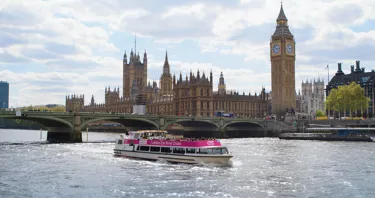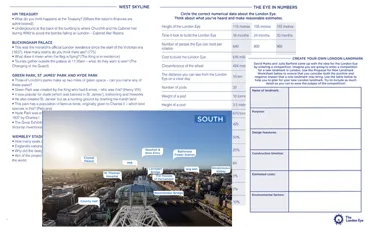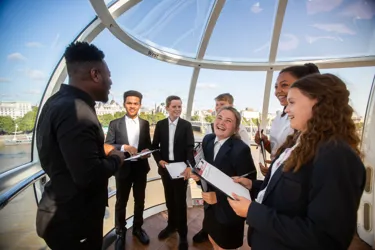The cultural capital
- Wednesday January 8th 2025
- cultural captial, social wellbeing, cross-curricular learning

School is all about building connection.
It is where students learn how to interact and build relationships with their peers, how to work as part of a team, and how to participate in shared school activities, be it drama club, sports teams or societies.
So, where better place than school to explore how this connection extends to the society around them?
We all benefit from young people that head out into the world as active, engaged citizens.
They’re more likely to contribute to their local communities, understand how their own actions have a direct impact on others and make career choices that reflect these values too.
Developing social wellbeing – through a strong sense of belonging, valuing diversity and an awareness of individual rights and responsibilities – is also a great way to help young people develop healthier relationships and enter into more meaningful interactions with others going forward.
But if the prospect of integrating this into school lesson plans feel a little daunting then don’t worry. There are some really simple ways to build cultural capital, introduce the concept of active citizenship and start students thinking about these wider connections.
Leverage London to elevate connection
The secret to building students’ sense of connection with the world around them is to turn abstract ideas into something tangible.
That’s why using London as a cross-curricular lens for learning is a fantastic starting point.
Brimming with culture, history and diversity, the UK capital is packed with opportunities to lift ideas out of a textbook and into real life
Looking to engage geography students on the impact of water pollution? Dive into the River Thames and explore its colourful history of contamination – from the ‘Great Stink’ to present day efforts to revive river wildlife habitats.

How about using the London as a living case study for the impact of tourism? With some 30 million tourists each year, the city is one of the world’s most-visited destinations and provides the perfect lens through which to explore the ripple effect on culture, economy and quality of life.
The city is also a great jumping off point for building up new interests that may transcend the curriculum. Be it architecture, transport, theatre or the impact of climate change, the cultural richness of the UK capital can help students to get motivated and engaged about the world outside their classroom window.
Whatever the topic or area of interest, using London as a platform for learning cultivates empathy and understanding and develops students’ understanding of their role in a wider ecosystem.
You don’t need to be based in London to reap the benefits of this approach either.
So well-known are many of its landmarks, from The London Eye to the London Underground, that the city provides an almost universally recognisable way to explore different ideas, regardless of where you’re based.

Enter The London Classroom
For inspiration and support on how to integrate London into your next class, we’ve created The London Classroom, a new educational programme designed to support teachers from KS1 to KS3 with using London as a way to inject excitement and a sense of real-world connection into the curriculum.
Take climate change. We know that young people are already preoccupied with threats to the environment. One in three are scared (33%) or pessimistic (34%) about the topic, according to a 2023 YouGov poll, and 28% say they feel ‘overwhelmed.’
Help them navigate this feeling of anxiety or helplessness, by focusing their attention on the concrete actions being taken to address climate change – and how they can help.
Use our fact match-up exercise to connect the dots between famous London landmarks and their efforts to cut down on carbon, and start a conversation with your class about what further steps could be taken. Challenge them to find out more about the planetary impact of popular attractions like The London Eye too and test their knowledge with our ‘The Eye In Numbers’ quiz.
Incorporating a huge collection of cross-curricular teacher resources, from one-off quick downloads to comprehensive assembly packs, digital lessons and even London-inspired mini projects, The London Classroom has everything you need to get started.

Embed learning on a school trip
Cement these connections with a school trip to London.
Giving students the chance to immerse themselves in the capital – and experience many of the sights, sounds and smells they’ve been exploring from afar – can help them connect the dots, and embed knowledge.
Research shows that trips can be formative for young people. The chance to experience a city like London firsthand can help students feel invested in and connected to the society around them. It can help build up their cultural capital and social development, granting them access to experiences they may not otherwise have had. Ultimately, it can raise aspirations and drive social mobility.
In fact, Ofsted actively encourages teachers to find ways to develop cultural capital, particularly among the most disadvantaged pupils.
To make the most of any London school trip, ensure you’ve created ways to help students connect in-classroom learning with what they experience while in London too.
If you’re heading to The London Eye, for example, we’ve created a collection of pod plans for you to use on the 30-minute flight, complete with learning objectives, statistics and a bank of easy activities with learning resources.
Teachers and schools have an invaluable role to play when it comes to creating active, engaged citizens that feel connected to the world around them. And with its opportunities for immersive, cross-curricular learning, London provides an ideal platform on which to start forming those connections.